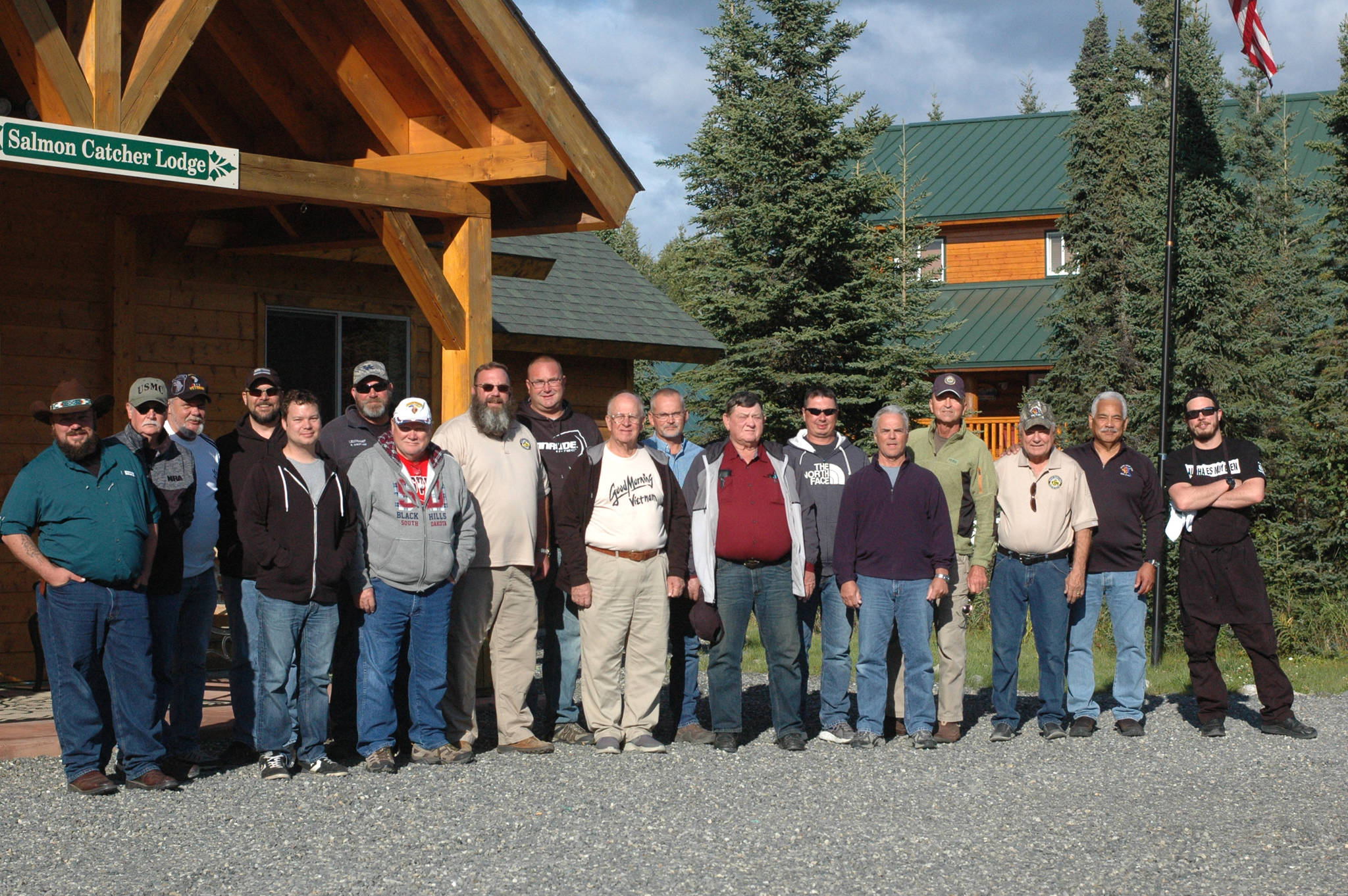When a group of veterans arrived from the Lower 48 to Alaska, some didn’t know each other from strangers. But now, nestled in a lodge in the back woods of Soldotna, they’ve tentatively built connections and friendships, linked by their shared experience as military service members, policemen, firefighters and paramedics.
For 11 seasons now, Chuck Reed has brought groups of veterans — both men and women — from Kentucky up to the Salmon Catch Lodge and other areas of Alaska as part of the Kentucky Wounded Heroes Project. It’s not the only event they do for veterans each year, but it’s one of the biggest.
The group started out as part of the Wounded Warriors Project but spun off into its own nonprofit in 2012 to include police, paramedics and firefighters. Reed, who is a retired state trooper, said the members of those services share similar experiences and can understand one another.
He said he’s seen emotional changes in groups he’s worked with.
“It’s called purging,” he said. “It does something in their systems. They let off steam. They just purge.”
Reed managed the lodge for a few seasons alongside owner Terry Johnson. During one of the summers, Johnson told Reed he could bring some of the members of the Wounded Heroes group up for some time at the lodge.
It’s not the only thing they do in Alaska — they head out in small planes to see the remoter parts of Southcentral Alaska, they meet up with friends in the Mat-Su Valley for a community barbecue, and they ride the Alaska Railroad out into Denali country. And of course, they hit the famous Alaska fishing streams. Many aspects of the trip, such as fishing trips and plane rides, are donated, bringing down the cost for the group.
Bryan Roach, who works with Reed to coordinate the program, said rather than conducting formal programming they try to provide a platform for people to network and talk about their experiences and trauma.
“We just sit there and everybody starts telling stories,” he said. “And it’s almost like you sit around a campfire and you start telling a story, and then the next person starts telling a story. If you wrote some of that stuff down, it’d be some of the most interesting books you’ve ever read in your life … (eventually) they realize that we’re not a threat, we’re just somebody who walked the same path or a similar path.”
The men who came up on the most recent trip to Alaska came from a variety of conflict zones and backgrounds. Rick Shropshire spent his career as a structure firefighter in Kentucky, while Bobby Pridemore served in Vietnam. They sat next to each other on the couch at Salmon Catcher Lodge on Friday and cracked a few jokes while relaxing before dinner. Others were former gunship pilots or police officers.
Some of what they share is the language, they said — the military is rife with acronyms and jargon, and groups that share those experiences can talk about it using that language without having to explain.
They can also connect over a common type of service or experience. Roach said even when they have groups with differences, including of both genders and from different occupations, they can find commonality in understanding each other’s experiences. Reed said military veterans may have come out of the service and gone to work as police or firefighters.
“Most of the police officers and firefighters we deal with, they’ve been in the Army, the Navy, the Marine Corps,” he said. “They just keep on.”
“They just keep on serving,” Roach added. “That was one of the things that I missed — you have all that camaraderie, and then once you get hurt, you’re put out.”
He credited Johnson, who buzzed around the lodge setting up dinner for the group Friday evening, as“our hero” and said the group was grateful for all the hospitality Alaskans have offered and their donations to support the groups’ visits each year. Often, people will approach them when they wear shirts or hats identifying themselves as veterans and talk about their own experiences in the service, Reed said. They’ve built relationships with several local veterans as well, who sometimes join them. An estimated one in 10 Alaskans is a military veteran, with tens of thousands of active service members on Joint Base Elmendorf-Richardson in Anchorage, Fort Wainwright near Fairbanks and the other seven military bases in the state.
Dealing with trauma in service can hamper veterans from recovering for a long time. The U.S. Department of Veterans Affairs states that the rate of post-traumatic stress disorder diagnoses varies by service area, though estimates say between 11–20 percent of Iraqi war veterans and about 12 percent of Gulf War veterans experience PTSD in a given year, and about 30 percent of Vietnam War veterans experience PTSD in their lifetimes.
The disorder can exacerbate other mental health problems as well, according to the VA. About 10 percent of veterans were seriously injured at some point during service, with seriously injured veterans reporting a more difficult experience adjusting back to civilian life than those who weren’t injured, according to a 2011 Pew Research Center survey of more than 1,800 veterans.
For Michael Rayley, who served in Vietnam, it was years before he even talked about what he experienced. He is now the president of the Kentucky chapter of the Order of the Purple Heart and works with his local Veterans Affairs hospital.
“I never really talked about it once I got out,” he said. “It took me a long time.”
Next to him, veteran Don Parrish said it may be hard for them to talk about what they’ve been through, but it helps.
“It’s way better than to not,” he said.
Reach Elizabeth Earl at eearl@peninsulaclarion.com.

